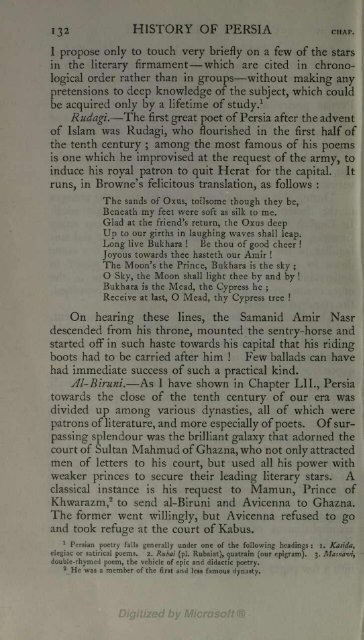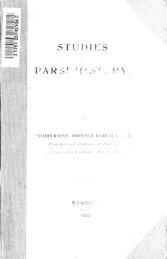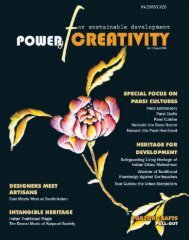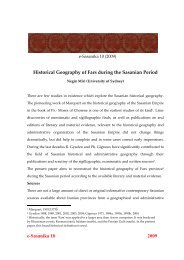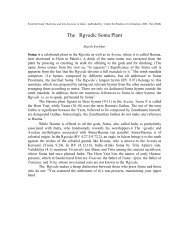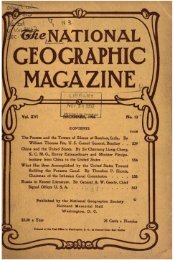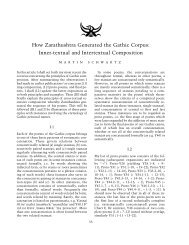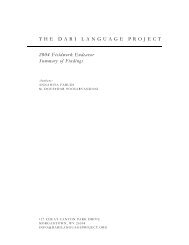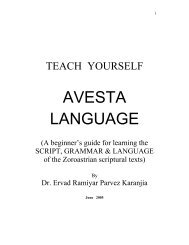- Page 6 and 7:
MACMILLAN AND CO., LONDON BOMBAY CA
- Page 8:
(Through the courtesy of Doctor Ahm
- Page 11 and 12:
A HISTORY OF PERSIA BY LIEUT. -CoL.
- Page 13 and 14:
-v'l PART OF A PERSIAN HUNTING SCEN
- Page 15 and 16:
-. CONTENTS Khorasan under the Cali
- Page 17 and 18:
CONTENTS ix CHAPTER LV PAGE THE MON
- Page 19 and 20:
CONTENTS xi CHAPTER LXI LITERATURE
- Page 21 and 22:
CONTENTS xiii CHAPTER LXVIII PAGE T
- Page 23 and 24:
CONTENTS xv CHAPTER LXXIV THE FOUND
- Page 25:
CONTENTS xvii CHAPTER ..... LXXX PA
- Page 28 and 29:
xx HISTORY OF PERSIA FACE PAGE . .
- Page 30 and 31:
MOHAMED SHAYBANI. MAPS VOL. To illu
- Page 33 and 34:
THI-; OPENING SURA OF THE KORAN. CH
- Page 35 and 36:
XLIV CAREER OF MOHAMED AT MECCA 3 r
- Page 37:
THE KA.MJ.V (From a Persian MS. in
- Page 40 and 41:
6 HISTORY OF PERSIA CHAP. but at la
- Page 42 and 43:
8 HISTORY OF PERSIA CHAP. Upon the
- Page 44:
io HISTORY OF PERSIA CHAP. admired
- Page 48:
12 HISTORY OF PERSIA CHAP. XLIV by
- Page 52:
1 4 HISTORY OF PERSIA CHAP. majorit
- Page 56 and 57:
1 6 HISTORY OF PERSIA CHAP. which t
- Page 58 and 59:
1 8 HISTORY OF PERSIA CHAP. God to
- Page 60 and 61:
20 HISTORY OF PERSIA CHAP. of refus
- Page 62 and 63:
22 HISTORY OF PERSIA CHAP. Spain th
- Page 64 and 65:
24 HISTORY OF PERSIA derided the im
- Page 66 and 67:
26 HISTORY OF PERSIA CHAP. 1. That
- Page 68 and 69:
28 HISTORY OF PERSIA Moslems lost 1
- Page 70 and 71:
30 HISTORY OF PERSIA CHAP. was stil
- Page 72 and 73:
32 HISTORY OF PERSIA CHAP. The Expa
- Page 74 and 75:
34 HISTORY OF PERSIA CHAP. The Proc
- Page 76 and 77:
3 6 HISTORY OF PERSIA but also in P
- Page 79 and 80:
ISLAM UNDER FIRST FOUR CALIPHS 37 H
- Page 81 and 82:
(Through the courtesy of H.E. the P
- Page 83 and 84:
THE TRAGEDY OF KERBELA 41 stances a
- Page 87 and 88:
THE TRAGEDY OF KERBELA 43 arrow, an
- Page 89:
THE PULPIT OF THK MAHDI. (In the Mo
- Page 92 and 93:
46 HISTORY OF PERSIA CHAP. XLVII It
- Page 94 and 95:
48 HISTORY OF PERSIA Caliph's publi
- Page 96 and 97:
50 HISTORY OF PERSIA CHAP. the troo
- Page 98 and 99:
52 HISTORY OF PERSIA CHAP. serving
- Page 100:
54 HISTORY OF PERSIA CHAP. The Achi
- Page 104 and 105:
56 HISTORY OF PERSIA CHAP. The Abba
- Page 106 and 107:
58 HISTORY OF PERSIA CHAP. of the h
- Page 108 and 109:
60 HISTORY OF PERSIA CHAP. XLVIH qu
- Page 110:
62 HISTORY OF PERSIA CHAP. is the t
- Page 113:
40 U G H R %.A S /A N Andarabah '^a
- Page 116:
64 HISTORY OF PERSIA c thou art a m
- Page 120 and 121:
66 HISTORY OF PERSIA daughter Khayz
- Page 122 and 123:
MAMUN AND THE IMAM RIZA. CHAPTER L
- Page 124 and 125:
70 HISTORY OF PERSIA and above all
- Page 126:
72 HISTORY OF PERSIA which he at le
- Page 130:
74 HISTORY OF PERSIA CHAP. and on M
- Page 134 and 135:
76 HISTORY OF PERSIA China date fro
- Page 136 and 137:
78 HISTORY OF PERSIA protest of hum
- Page 138 and 139:
80 HISTORY OF PERSIA of hard fighti
- Page 140 and 141:
AMR-UL-LAIS. CHAPTER LI THE DECAY O
- Page 142:
84 HISTORY OF PERSIA broke out in e
- Page 145:
CENTRAL ASIA London: Macmilla,n &.
- Page 149 and 150:
DECAY OF THE CALIPHATE 85 ruled the
- Page 151 and 152:
DECAY OF THE CALIPHATE 87 him, late
- Page 153 and 154: DECAY OF THE CALIPHATK 89 and drove
- Page 155 and 156: DECAY OF THE CALIPHATE 91 succeeded
- Page 157: '>;>i>t n phot t\$i'af>h I'V Major
- Page 160 and 161: 94 HISTORY OF PERSIA robber called
- Page 162 and 163: 9 6 HISTORY OF PERSIA able man exte
- Page 164 and 165: , rfl| . TOGHRII, BEG. CHAPTER LII
- Page 166 and 167: ioo HISTORY OF PERSIA CHAP. invader
- Page 169 and 170: THE SELJUK TURKS 101 the ground, an
- Page 171 and 172: I _ LII THE SELJUK TURKS 103 lifeti
- Page 173 and 174: ! played THE SELJUK TURKS 105 vast
- Page 175 and 176: LIT THE SELJUK TURKS 107 The Minist
- Page 177 and 178: LII THE SELJUK TURKS 109 present da
- Page 179 and 180: i ALilik 1X04) THP: SELJUK TURKS 1
- Page 181 and 182: i THE SELJUK TURKS 113 and when rep
- Page 183 and 184: THE SELJUK TURKS 115 Some ten years
- Page 185 and 186: LI, THE SELJUK TURKS 117 at that ti
- Page 187 and 188: CH.LIII DISRUPTION OF SELJUK EMPIRE
- Page 189 and 190: DISRUPTION OF SELJUK EMPIRE 121 and
- Page 191 and 192: DISRUPTION OF SELJUK EMPIRE 123 lef
- Page 193: a I
- Page 196: 126 HISTORY OF PERSIA CHAP. relatio
- Page 200 and 201: 128 HISTORY OF PERSIA CHAP. notice,
- Page 202 and 203: FROM THE "DIWAN" OF NASIR-I-KHUSRU.
- Page 206 and 207: i 3 4 HISTORY OF PERSIA Tabaran dis
- Page 209 and 210: PERSIAN LITERATURE 135 was written
- Page 213 and 214: LIV PERSIAN LITERATURE 137 Omar Kha
- Page 217 and 218: LIV PERSIAN LITERATURE 139 mysticis
- Page 219: X \ & < < --> -1.
- Page 222 and 223: 1 42 HISTORY OF PERSIA CHAP. Anothe
- Page 224 and 225: MANGU. CHAPTER LV THE MONGOL CATACL
- Page 226 and 227: 146 HISTORY OF PERSIA CHAP. and to
- Page 229 and 230: THE MONGOL CATACLYSM 147 of his imm
- Page 231: l>fc :* A *! Ti" I I KARA KHITAN, S
- Page 234 and 235: 1 50 HISTORY OF PERSIA CHAP. who wa
- Page 236 and 237: 1 52 HISTORY OF PERSIA their own bo
- Page 238 and 239: i 5 4 HISTORY OF PERSIA To remedy t
- Page 240 and 241: 156 HISTORY OF PERSIA CHAP. for a v
- Page 242 and 243: 1 58 HISTORY OF PERSIA CHAP. shot a
- Page 244 and 245: 160 HISTORY OF PERSIA was almost ex
- Page 246 and 247: HULAGU. CHAPTER LVI THE EXTINCTION
- Page 248 and 249: 164 HISTORY OF PERSIA Tartars, and
- Page 250 and 251: 1 66 HISTORY OF PERSIA intrepid sol
- Page 252 and 253: 1 68 HISTORY OF PERSIA CHAP. spared
- Page 254 and 255:
i yo HISTORY OF PERSIA CHAP. Karaco
- Page 257 and 258:
LVI EXTINCTION OF THE CALIPHATE 171
- Page 259 and 260:
LVI EXTINCTION OF THE CALIPHATE 173
- Page 261:
TIIK SIKGK OF BAGHDAD BY HULAGU KUA
- Page 264 and 265:
1 76 HISTORY OF PERSIA CHAP.LVI Ass
- Page 266 and 267:
178 HISTORY OF PERSIA Court. She is
- Page 268 and 269:
i8o HISTORY OF PERSIA CHAP. exclaim
- Page 270:
1 82 HISTORY OF PERSIA had been est
- Page 274 and 275:
1 84 HISTORY OF PERSIA bad, so that
- Page 276 and 277:
1 86 HISTORY OF PERSIA two years la
- Page 278 and 279:
GHAZAN. CHAPTER LVIII That which wa
- Page 280 and 281:
1 90 HISTORY OF PERSIA thousand men
- Page 283 and 284:
LVIII GHAZAN KHAN 191 same Turks, w
- Page 285 and 286:
GHAZAN KHAN 193 a secret until he h
- Page 289 and 290:
T.VIII GHAZAN KHAN 195 World Conque
- Page 291 and 292:
. A,. MX TAMERLANE 197 This act cau
- Page 293:
TAMERLANE. (From F. R. Martin's Min
- Page 296 and 297:
200 HISTORY OF PERSIA they answered
- Page 298:
202 HISTORY OF PERSIA which has alr
- Page 302 and 303:
204 HISTORY OF PERSIA familiar to h
- Page 304 and 305:
1 Vide 206 HISTORY OF PERSIA At the
- Page 306 and 307:
2o8 HISTORY OF PERSIA CHAP. Multan
- Page 308:
210 HISTORY OF PERSIA preserved, co
- Page 312 and 313:
212 HISTORY OF PERSIA up the water
- Page 315 and 316:
TAMERLANE 213 describe." He also re
- Page 317:
THE TOMB OF TAMERLANE. (In the fore
- Page 320 and 321:
SHAH RUKH. CHAPTER LX THE TIMURID M
- Page 322 and 323:
218 HISTORY OF PERSIA CHAP. A truly
- Page 325 and 326:
THE TIMURID MONARCHS 219 throne wit
- Page 329 and 330:
THE T1MURID MONARCHS 221 to the Sul
- Page 331:
1 BARER ON HIS THRONK. (From a MS.
- Page 334 and 335:
224 HISTORY OF PERSIA CHAP. LX and
- Page 336 and 337:
226 HISTORY OF PERSIA CHAP. also ut
- Page 338 and 339:
228 HISTORY OF PERSIA upon thee, tu
- Page 340 and 341:
2 30 HISTORY OF PERSIA CHAP. This o
- Page 342:
232 HISTORY OF PERSIA O cypress-tre
- Page 346 and 347:
234 HISTORY OF PERSIA CHAP. The bel
- Page 348:
236 HISTORY OF PERSIA the Glory of
- Page 352:
2 3 8 HISTORY OF PERSIA colleges, b
- Page 356 and 357:
ISMAIL I. CHAPTER LXII THE RISE OF
- Page 358 and 359:
242 HISTORY OF PERSIA the throne mu
- Page 360:
244 HISTORY OF PERSIA the Tarikh-i-
- Page 364:
246 HISTORY OF PERSIA janissaries,
- Page 368 and 369:
248 HISTORY OF PERSIA CHAP. Baber o
- Page 371 and 372:
LXII RISE OF THE SAFAVI DYNASTY 249
- Page 373 and 374:
RISE OF THE SAFAVI DYNASTY 251 mort
- Page 375 and 376:
LXII RISE OF THE SAFAVI DYNASTY 253
- Page 377 and 378:
RISE OF THE SAFAVI DYNASTY 255 993
- Page 379 and 380:
SHAH ABBAS THE GREAT 257 two nobles
- Page 381:
A KURDISH VILLA* il.. (From \Yiirrr
- Page 384 and 385:
260 HISTORY OF PERSIA \ ^Jj th-disp
- Page 386 and 387:
262 HISTORY OF PERSIA CHAP. and pro
- Page 388 and 389:
264 HISTORY OF PERSIA mgio army, ho
- Page 390 and 391:
266 HISTORY OF PERSIA seclusion, an
- Page 392 and 393:
268 HISTORY OF PERSIA credit in an
- Page 394 and 395:
270 HISTORY OF PERSIA results becam
- Page 396:
272 HISTORY OF PERSIA CHAP. The Fai
- Page 400 and 401:
274 HISTORY OF PERSIA Steele, who h
- Page 402 and 403:
276 HISTORY OF PERSIA CHAP, Jask wa
- Page 404 and 405:
278 HISTORY OF PERSIA of the whole
- Page 406:
280 HISTORY OF PERSIA was captured
- Page 410 and 411:
282 HISTORY OF PERSIA island empori
- Page 413 and 414:
STRUGGLE IN THE PERSIAN GULF 283 in
- Page 415 and 416:
CHAP.LXV ARCHITECTURE AND ART 285 a
- Page 421 and 422:
LXV ARCHITECTURE AND ART 287 us the
- Page 425 and 426:
ARCHITECTURE AND ART 289 added to t
- Page 427 and 428:
: . 1 *F t * ' ufl fc> ^#^ty*$frv$*
- Page 429 and 430:
mEfflSBWF!8
- Page 431 and 432:
ARCHITECTURE AND ART 291 silk carpe
- Page 435 and 436:
LXV . ARCHITECTURE AND ART 293 Amer
- Page 437:
m COLLEGE OF SHAH SULTAN HUSAYN, IS
- Page 440 and 441:
SHAH HUSAYN. CHAPTER LXVI THE DECLI
- Page 442:
298 HISTORY OF PERSIA negative resu
- Page 446 and 447:
300 HISTORY OF PERSIA CHAP. force w
- Page 449 and 450:
I DECLINE OF SAFAVI DYNASTY 301 of
- Page 453 and 454:
DECLINE OF SAFAVI DYNASTY 303 posts
- Page 455 and 456:
3 MAHMUD OF GHAZNI. CHAPTER LXVII T
- Page 457 and 458:
THE GHILZAIS OF KANDAHAR 307 partic
- Page 459 and 460:
THE GHILZAIS OF KANDAHAR 309 false
- Page 461 and 462:
I THE GHILZAIS OF KANDAHAR 311 The
- Page 463 and 464:
CH...XV.H OVERTHROW OF SAFAVI DYNAS
- Page 465 and 466:
LXV,,, OVERTHROW OF SAFAVI DYNASTY
- Page 469 and 470:
I. X VIII OVERTHROW OF SAFAV1 DYNAS
- Page 473 and 474:
LXV OVERTHROW OF SAFAVI DYNASTY 319
- Page 475 and 476:
A.SHKAK. CHAPTER LXIX THE EXPULSION
- Page 477 and 478:
EXPULSION OF THE AFGHANS 323 plunde
- Page 479 and 480:
EXPULSION OF THE AFGHANS 325 attemp
- Page 483 and 484:
EXPULSION OF THE AFGHANS 327 : his
- Page 485:
- /'.ngi-Ht- II. \M.\D.\N WITH MOUN
- Page 488 and 489:
330 HISTORY OF PERSIA put to death
- Page 490 and 491:
332 HISTORY OF PERSIA CHAP. dynasty
- Page 492 and 493:
334 HISTORY OF PERSIA Tahmasp urged
- Page 494 and 495:
336 HISTORY OF PERSIA banks. It is
- Page 496 and 497:
338 HISTORY OF PERSIA CHAP. LXIX ad
- Page 498:
340 HISTORY OF PERSIA Kuli was a ha
- Page 502 and 503:
342 HISTORY OF PERSIA in the name o
- Page 505 and 506:
LXX RISE OF NADIR KUl.I 343 Defeati
- Page 507 and 508:
RISE OF NADIR KULI 345 until it rea
- Page 509:
i Knmi NADIR SHAH, a iVr.si.m pir;-
- Page 512 and 513:
348 HISTORY OF PERSIA Moslem empire
- Page 515 and 516:
[Purport. HOLOGRAPH DOCUMENT SIGNED
- Page 517:
mBHBHHHHHB^Hl^HHHHHBBHHHHBH^BIIHH /
- Page 520 and 521:
352 HISTORY OF PERSIA CHAP. the eff
- Page 522 and 523:
354 HISTORY OF PERSIA the fortifica
- Page 525 and 526:
CONQUESTS OF NADIR SHAH 355 court,
- Page 527 and 528:
LXXI CONQUESTS OF NADIR SHAH 357 sa
- Page 529:
';
- Page 532 and 533:
NADIR SHAH. CHAPTER LXXII THE LAST
- Page 534 and 535:
362 HISTORY OF PERSIA lives to save
- Page 536 and 537:
364 HISTORY OF PERSIA CHAP. served
- Page 539 and 540:
LAST YEARS OF NADIR SHAH 365 reali/
- Page 541 and 542:
LAST YEARS OF NADIR SHAH 367 a ship
- Page 543 and 544:
LAST YEARS OF NADIR SHAH 369 and Na
- Page 545 and 546:
CH.LXXIH SHORT-LIVED ZAND DYNASTY 3
- Page 547:
fl A BRIDGE ACROSS THE RIVER KARUN.
- Page 550 and 551:
374 HISTORY OF PERSIA Meanwhile Kar
- Page 553 and 554:
SHORT-LIVED ZAND DYNASTY 375 Husayn
- Page 557 and 558:
SHORT-LIVED ZAND DYNASTY 377 Gulf.
- Page 559 and 560:
SHORT-LIVED ZAND DYNASTY 379 except
- Page 561:
LUTF AM KUAN. (From ;i picture in t
- Page 564:
3 82 HISTORY OF PERSIA CHAP. to sei
- Page 568 and 569:
384 HISTORY OF PERSIA unspeakable t
- Page 570 and 571:
3 86 HISTORY OF PERSIA CHAP. ately
- Page 572:
388 HISTORY OF PERSIA CHAP. Khan an
- Page 576 and 577:
390 HISTORY OF PERSIA " Keianian He
- Page 579 and 580:
partly in boats and r' 1 partly by
- Page 581:
AGA MAHOMED KHAN. (From an original
- Page 584 and 585:
394 HISTORY OF PERSIA ment from Teh
- Page 586 and 587:
396 HISTORY OF PERSIA pursuance of
- Page 588 and 589:
398 HISTORY OF PERSIA and the Afgha
- Page 591 and 592:
R1TISH AND FRENCH MISSIONS 399 The
- Page 593 and 594:
,xxv BRITISH AND FRENCH MISSIONS 40
- Page 595 and 596:
BRITISH AND FRENCH MISSIONS 403 to
- Page 597 and 598:
.xxv BRITISH AND FRENCH MISSIONS 40
- Page 599 and 600:
, s BRITISH AND FRENCH MISSIONS 407
- Page 601 and 602:
ixxv BRITISH AND FRENCH MISSICT 409
- Page 603 and 604:
n. ixxv, DISASTROUS CAMPAIGNS 411 s
- Page 605:
- 1
- Page 608 and 609:
4H HISTORY OF PERSIA CHAP. She cede
- Page 610 and 611:
i 4 6 HISTORY OF PERSIA This act le
- Page 613 and 614:
DISASTROUS CAMPAIGNS 417 Luke, the
- Page 615 and 616:
however, spared, DISASTROUS CAMPAIG
- Page 617 and 618:
: DISASTROUS CAMPAIGNS 421 and at l
- Page 619 and 620:
SHAH. CHAPTER LXXVII PERSIAN AGGRES
- Page 621 and 622:
j AGGRESSION ON AFGHANISTAN 425 to
- Page 623 and 624:
: LXXVII AGGRESSION ON AFGHAN 427 h
- Page 627 and 628:
LXXVI, AGGRESSION ON AFGHANISTAN 42
- Page 629 and 630:
AGGRESSION ON AFGHANISTAN support t
- Page 633 and 634:
AGGRESSION ON AFGHANISTAN 433 comer
- Page 635 and 636:
AGGRESSION ON AFGHANISTAN 435 besie
- Page 637 and 638:
LXXVII AGGRESSION ON AFGHANISTAN 43
- Page 639 and 640:
AGGRESSION ON AFGHANISTAN 439 invad
- Page 641 and 642:
MOIIAMEU SHAH. CHAPTER LXXVIII THE
- Page 643 and 644:
THE PERSO-AFGHAN QUESTION 443 son o
- Page 645:
'nll ,1 />': THK SHKI.NI. OF KIKMA
- Page 648 and 649:
446 HISTORY OF PERSIA CHAP. For a w
- Page 651 and 652:
I.XXVHI THE PERSO-AFGHAN (Jl 1 I IO
- Page 653 and 654:
LXXVIII THE PERSO-AFGHAN QUESTION 4
- Page 655 and 656:
THE PERSO-AFGHAN QUESTION 451 .1 th
- Page 657 and 658:
THE PERSO-AFGHAN (j ION of our stat
- Page 661 and 662:
THE PERSO-AFGHAN QUESTION 455 were
- Page 663 and 664:
LXXVIII THE PERSO-AFGHAN QUESTION 4
- Page 665 and 666:
. HAP. LXXIX ENVELOPMENT OF PERSIA
- Page 667 and 668:
LXXIX ENVELOPMENT OF PERSIA 461 vot
- Page 669 and 670:
ENVELOPMENT OF PERSIA 463 the victo
- Page 673 and 674:
LXXIX ENVELOPMENT OF PERSIA 465 mus
- Page 677 and 678:
LXXIX ENVELOPMENT OF PERSIA 467 sov
- Page 681 and 682:
ENVELOPMENT OF PERSIA 469 Ladgasht,
- Page 683 and 684:
ENVELOPMENT OF PERSIA 471 Summary.
- Page 685 and 686:
CH.LXXX THE AWAKENING OF PERSIA 473
- Page 687 and 688:
; rifles . ' THE AWAKENING OF PERSI
- Page 689:
II.I.M. \ASIK-U-I)IN. (Through the
- Page 692 and 693:
478 HISTORY OF PERSIA CHAP. Imperia
- Page 694 and 695:
4 8o HISTORY OF PERSIA path, but in
- Page 696 and 697:
482 HISTORY OF PERSIA CHAP. was ava
- Page 698 and 699:
484 HISTORY OF PERSIA CHAP. moderat
- Page 701 and 702:
IKX THE AWAKENING OF PERSIA 485 Ali
- Page 703 and 704:
^- jw li,i ' I " A TITLES OF THE SH
- Page 707 and 708:
PERSIA BEFORE THE REVOLUTION 489 ap
- Page 709 and 710:
PERSIA BEFORE THE REVOLUTION 491 ve
- Page 713 and 714:
PERSIA BEFORE THE REVOLUTION 493 4.
- Page 715 and 716:
PERSIA BEFORE THE REVOLUTION 495 a
- Page 719 and 720:
PERSIA BEFORE THE REVOLUTION 497 co
- Page 721 and 722:
PERSIA BEFORE THE REVOLUTION 499 le
- Page 723 and 724:
GRANTING OF A CONSTITUTION 501 inte
- Page 725 and 726:
xii GRANTING OF A CONSTITUTION 503
- Page 727:
' H.H. THK KARMAN KARMA.
- Page 730 and 731:
' 506 HISTORY OF PERSIA CHAP. princ
- Page 732 and 733:
508 HISTORY OF PERSIA CHAP. a stude
- Page 735 and 736:
GRANTING OF A CONSTITUTION 509 peop
- Page 737:
GRANTING OF A CONSTITUTION 5 1 1 wo
- Page 740 and 741:
5H HISTORY OF PERSIA Coinage of Lyd
- Page 742 and 743:
516 HISTORY OF PERSIA India in the
- Page 744 and 745:
518 HISTORY OF PERSIA Song of the R
- Page 746 and 747:
520 HISTORY OF PERSIA Abul Hasan, M
- Page 748 and 749:
522 HISTORY OF PERSIA Alikhanoff, R
- Page 750 and 751:
524 HISTORY OF PERSIA Arsaces (son
- Page 752 and 753:
HISTORY OF PERSIA foundation of, 65
- Page 754 and 755:
, Callias, HISTORY OF PERSIA Butene
- Page 756 and 757:
530 HISTORY OF PERSIA Constantius,
- Page 758 and 759:
532 HISTORY OF PERSIA Duranri, Sir
- Page 760 and 761:
534 HISTORY OF PERSIA Gandash (or G
- Page 762 and 763:
536 HISTORY OF PERSIA 455 - 456 ; c
- Page 764 and 765:
538 HISTORY OF PERSIA Hi, River, i.
- Page 766 and 767:
540 HISTORY OF PERSIA Kalposh, mead
- Page 768 and 769:
542 HISTORY OF PERSIA Kizilbash tri
- Page 770 and 771:
544 HISTORY OF PERSIA Malik Dinar,
- Page 772 and 773:
54 6 HISTORY OF PERSIA Mithradates,
- Page 774 and 775:
548 HISTORY OF PERSIA Nasrulla Mirz
- Page 776 and 777:
550 HISTORY OF PERSIA defeat by the
- Page 778 and 779:
55 2 HISTORY OF PERSIA expedition o
- Page 780 and 781:
554 HISTORY OF PERSIA Pison, River,
- Page 782 and 783:
556 HISTORY OF PERSIA 471 Kobad's f
- Page 784 and 785:
558 HISTORY OF PERSIA 313, 314, 315
- Page 786 and 787:
560 HISTORY OF PERSIA Su, lake of,
- Page 788 and 789:
S 62 HISTORY OF PERSIA Tiglath-pile
- Page 790 and 791:
HISTORY OF PERSIA Vonones II., i. 4
- Page 793 and 794:
A'K THE SAME AUTHOR. 8vo. i os. net
- Page 797:
PLEASE DO NOT REMOVE CARDS OR SLIPS


